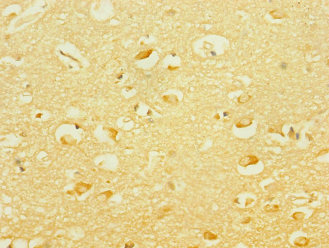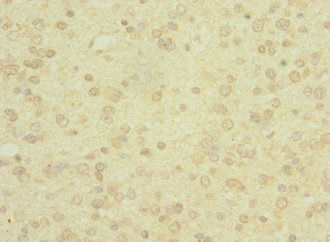PCDH19 Antibody
-
货号:CSB-PA844701ESR2HU
-
规格:¥440
-
促销:
-
图片:
-
其他:
产品详情
-
产品名称:Rabbit anti-Homo sapiens (Human) PCDH19 Polyclonal antibody
-
Uniprot No.:Q8TAB3
-
基因名:PCDH19
-
别名:KIAA1313 antibody; PCD19_HUMAN antibody; PCDH19 antibody; Protocadherin 19 antibody; Protocadherin-19 antibody
-
宿主:Rabbit
-
反应种属:Human
-
免疫原:Recombinant Human Protocadherin-19 protein (568-678AA)
-
免疫原种属:Homo sapiens (Human)
-
标记方式:Non-conjugated
-
克隆类型:Polyclonal
-
抗体亚型:IgG
-
纯化方式:Antigen Affinity Purified
-
浓度:It differs from different batches. Please contact us to confirm it.
-
保存缓冲液:PBS with 0.02% sodium azide, 50% glycerol, pH7.3.
-
产品提供形式:Liquid
-
应用范围:ELISA, IHC
-
推荐稀释比:
Application Recommended Dilution IHC 1:20-1:200 -
Protocols:
-
储存条件:Upon receipt, store at -20°C or -80°C. Avoid repeated freeze.
-
货期:Basically, we can dispatch the products out in 1-3 working days after receiving your orders. Delivery time maybe differs from different purchasing way or location, please kindly consult your local distributors for specific delivery time.
相关产品
靶点详情
-
功能:Potential calcium-dependent cell-adhesion protein.
-
基因功能参考文献:
- we have added to the characterization of PCDH19-related epilepsy. In addition to epilepsy, affected individuals display a complex neuropsychiatric syndrome in which the behavioral and sleep dysregulation are prominent. PMID: 29377098
- reaffirm the similarity between male and female PCDH19-related phenotypes, now also in a later phase of the disorder PMID: 28669061
- We report the fifth confirmed male with somatic mosaicism of a novel pathogenic variant c.2147+2 T>C located in the splice site of Intron 1 of the PCDH19 gene, which continues to support that cellular interference is responsible for the pathogenic mechanism PMID: 28462982
- This is the second male with somatic mosaicism for PCDH19 deficiency, providing further support for cellular interference as the pathogenic mechanism for this condition, which leads to this unusual mode of inheritance in which females are more severely affected than males. PMID: 27016041
- Our results show a large spectrum of intellectual disability and a very high rate of Autism spectrum disorder in patients with epilepsy and PCDH-19 mutations PMID: 27179713
- These findings point to multiple defects in peripheral steroidogenesis associated with and potentially relevant to PCDH19-FE. Some of these defects could be addressed by stimulating adrenocortical activity. PMID: 28471529
- Results summarized the clinical spectrum of female epilepsy patients with protocadherin 19 (PCDH19) mutations in a Chinese population. PMID: 27527380
- mild tonic, fluttering and mild clonic phases were most characteristic of seizures of PCDH19-related epilepsy PMID: 26898795
- The study demonistrated that most effective drugs in patients with PCDH19 mutations were bromide and clobazam. PMID: 26820223
- PCDH19 has a role in instructing the apico-basal polarity of the progenitor cells, thus regulating the development of a properly organized human brain PMID: 26450854
- Two mosaic PCDH19 point mutations are described in male patients with PCDH19-related epilepsy. PMID: 26765483
- steroids and in particular neurosteroids (e.g. allopregnanolone) play an important role in PCDH19-FE and represent a realistic therapeutic target. PMID: 26123493
- This case report is suggestive of a good response of PCDH19-related Epilepsy to stiripentol PMID: 25510386
- This study proposes corticosteroid treatment as an efficacious adjunctive treatment for the acute symptoms of PCDH19-Generalized Convulsive Epilepsy and suggests BBB involvement in this disease. PMID: 25891919
- analysis of four novel mutations in the PCDH19 gene found in isolated cases of girls with infantile onset epilepsy PMID: 25227595
- The present findings confirm that PCDH19 is a major causative gene for infantile onset familial or sporadic epilepsy in female patients with or without mental retardation. PMID: 25218114
- girls with a de novo mutation in PCDH19 presented a delay of expressive language acquisition and lower scores at follow-up testing completed at older ages PMID: 25499160
- Epileptic encephalopathy related to mutations in the PCDH19 genes. PMID: 25818041
- PCDH19-related epilepsy could be considered a well-defined epileptic syndrome, affecting only females, included in the group of epilepsies with febrile and afebrile seizures [review] PMID: 25204757
- This study highlighted the significance of PCDH19 deletion, a unique pattern of initial seizure clusters, and the efficacy of antiepileptic drugs PMID: 23712037
- Phenotypic spectrum associated with PCDH19 mutations in Dravet-like and epilepsy and mental retardation limited to females patients and in males with autism spectrum disorders. PMID: 23334464
- Mutations of PCDH19 have also been reported in female patients with clinical findings compatible with Dravet syndrome [review] PMID: 23093055
- Deletions at PCDH19 cause female-restricted epilepsy with mental retardation. PMID: 22091964
- this study describes a PCDH19 mutation segregating from an asymptomatic mother to an epilepsy with mental retardation patient. PMID: 22949144
- SCN1A and PCDH19 mutations in Chinese children with Dravet syndrome PMID: 22848613
- Mutations in PCDH19 and other genes with rare copy number variations are not responsible for febrile infection-related epilepsy syndrome (FIRES). PMID: 23066759
- This study demonistrated that most patients with PCDH19 mutations exhibit a distinctive electroclinical pattern of focal seizures with affective symptoms, suggesting an epileptogenic dysfunction involving the frontotemporal limbic system. PMID: 22946748
- This study presented that PCDH19 mutation cause of genetic epilepsy in females. PMID: 22504056
- PCDH19 mutation is a relatively frequent cause of epilepsy in Japanese females. PMID: 22050978
- case report of missense heterozygous c.1129G>C (p.Asp377His) mutation and acute-onset epilepsy triggered by fever PMID: 21777234
- mutations in PCDH19 are a relatively frequent cause of epilepsy in females. PMID: 21053371
- missense and frameshift mutations and spectrum of resulting epilepsy phenotypes in female patients PMID: 21480887
- findings show that gonadal mosaicism of a PCDH19 mutation in a parent is an important molecular mechanism associated with the inheritance of epilepsy and mental retardation in females PMID: 21519002
- Cognitive impairment in patients with PCDH19 mutations and a Dravet-like phenotype varies in severity, and no sufficient evidence exists that any correlation exists between type of mutation and severity of cognitive impairment and epilepsy [review] PMID: 21504426
- Article shows importance of testing PCDH19 in females with early onset epilepsy, intellectual impairment, and autistic features, regardless of family history. PMID: 20830798
- This study indicted that PCDH19 is emerging as a major gene for infantile-onset familial or sporadic epilepsy in female patients with or without mental retardation. PMID: 20713952
- Using a sample of male subjects diagnosed with autism spectrum disorders, markers were tested covering the entire X chromosome using a family-based association study. Association was revealed at DXS8043 (P=0.0101). PMID: 16261168
- X-linked protocadherin 19 mutations cause female-limited epilepsy and cognitive impairment PMID: 18469813
- Mutation of PCDH19 plays a major role in epileptic encephalopathies, mainly affects females. PMID: 19214208
显示更多
收起更多
-
相关疾病:Epileptic encephalopathy, early infantile, 9 (EIEE9)
-
亚细胞定位:Cell membrane; Single-pass type I membrane protein.
-
组织特异性:Moderately expressed in all regions of the brain examined, with lowest levels found in the cerebellum. Moderate expression is also found in ovary, and low expression in all other tissues tested. Also detected in primary skin fibroblast.
-
数据库链接:
HGNC: 14270
OMIM: 300088
KEGG: hsa:57526
STRING: 9606.ENSP00000362125
UniGene: Hs.4993
Most popular with customers
-
YWHAB Recombinant Monoclonal Antibody
Applications: ELISA, WB, IF, FC
Species Reactivity: Human, Mouse, Rat
-
-
-
-
-
-
-























